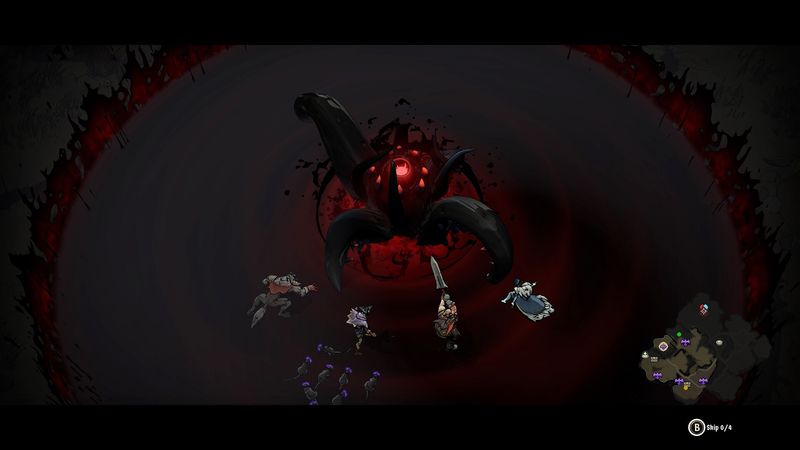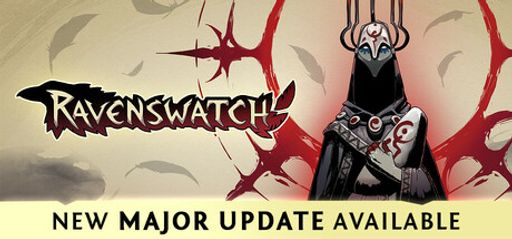 Hey everyone, have you checked out Ravenswatch from Passtech Games and published by Nacon? I jumped in recently, and right off the bat, the game’s blend of roguelike action with a dark fantasy vibe pulled me in. Playing legendary figures like a cursed Little Red Riding Hood or the fallen monkey king is insanely cool. The developers captured an epic tale with comic book style visuals and immersive open maps inspired by enchanted forests and Arthurian legends. Even the positive chatter on Steam about the fun four-player co-op and unique character abilities got me excited. Granted, some feedback mentioned that the map variations and enemy designs could mix things up a bit more, but it still fits my craving for unique adventures.
Hey everyone, have you checked out Ravenswatch from Passtech Games and published by Nacon? I jumped in recently, and right off the bat, the game’s blend of roguelike action with a dark fantasy vibe pulled me in. Playing legendary figures like a cursed Little Red Riding Hood or the fallen monkey king is insanely cool. The developers captured an epic tale with comic book style visuals and immersive open maps inspired by enchanted forests and Arthurian legends. Even the positive chatter on Steam about the fun four-player co-op and unique character abilities got me excited. Granted, some feedback mentioned that the map variations and enemy designs could mix things up a bit more, but it still fits my craving for unique adventures.
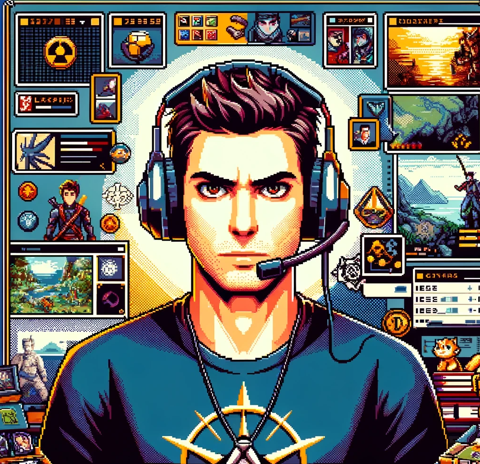 Absolutely, NewGamer. I was deep into exploring every nook and cranny of Ravenswatch, and the level of detail is impressive. Passtech Games seems determined to offer endless replay value with over 200 talents and 50 magical items. I loved uncovering each hero’s backstory through hidden collectibles and side quests. The maps may repeat some points of interest, but they still pack a punch in atmosphere. Nacon’s publishing muscle helped polish the presentation, even if some areas—like the limited enemy variety on some maps—need refinement. For a meticulous player like me, optimizing build synergies and unlocking every secret is truly rewarding.
Absolutely, NewGamer. I was deep into exploring every nook and cranny of Ravenswatch, and the level of detail is impressive. Passtech Games seems determined to offer endless replay value with over 200 talents and 50 magical items. I loved uncovering each hero’s backstory through hidden collectibles and side quests. The maps may repeat some points of interest, but they still pack a punch in atmosphere. Nacon’s publishing muscle helped polish the presentation, even if some areas—like the limited enemy variety on some maps—need refinement. For a meticulous player like me, optimizing build synergies and unlocking every secret is truly rewarding.
 I couldn’t agree more. Diving into the mechanics, what struck me was the creative interplay between talents and items. It demands both tactical planning and real-time strategy during hectic boss battles. The control mechanics in nerve-racking fights offer a fresh twist compared to Risk of Rain 2 or Binding of Isaac. Every hero—from the Snow Queen to Sinbad the Sailor—has a unique playstyle that rewards skillful positioning and split-second decision-making. Even though some players noted technical issues like client crashes in long sessions, these are manageable bugs that I hope will be fixed soon given the developers’ responsiveness.
I couldn’t agree more. Diving into the mechanics, what struck me was the creative interplay between talents and items. It demands both tactical planning and real-time strategy during hectic boss battles. The control mechanics in nerve-racking fights offer a fresh twist compared to Risk of Rain 2 or Binding of Isaac. Every hero—from the Snow Queen to Sinbad the Sailor—has a unique playstyle that rewards skillful positioning and split-second decision-making. Even though some players noted technical issues like client crashes in long sessions, these are manageable bugs that I hope will be fixed soon given the developers’ responsiveness.
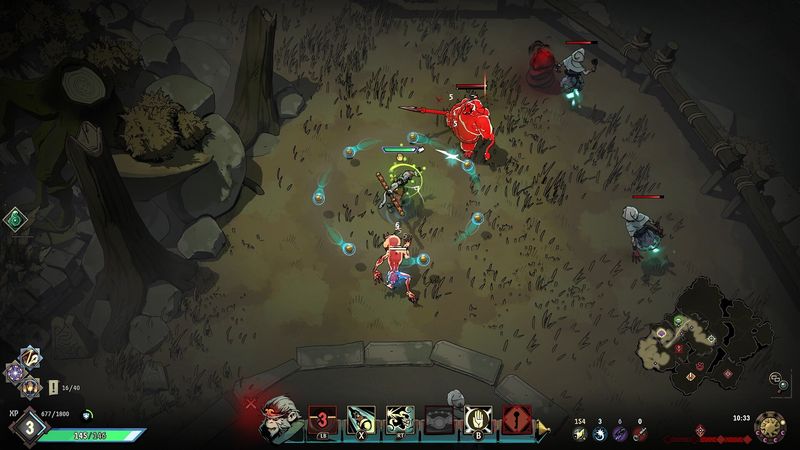
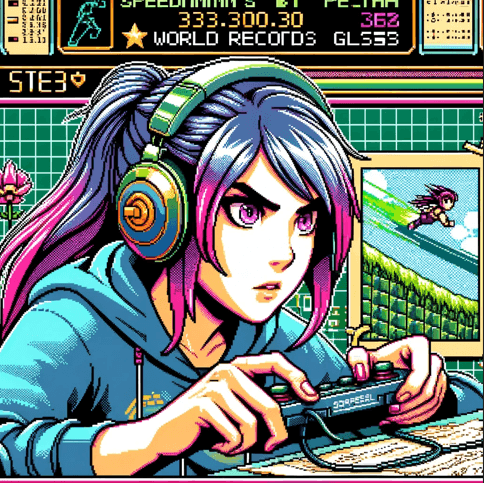 You all hit the nail on the head! From my speedrunning perspective, every second counts. Ravenswatch challenges you to optimize fast-paced gameplay. The variety in talents and constant build tweaking keeps each run unique, even if some map elements repeat. I’m always looking for ways to shave off extra seconds, and the dynamic combination of run-based upgrades and co-op mode opens up many strategies. Some Steam reviews mentioned that runs could use more random faction events to diversify the challenge. Still, the game offers plenty of room to experiment with speedrun tactics. It lets competitive players perfect their timing and movement, which speaks volumes about its well-balanced design.
You all hit the nail on the head! From my speedrunning perspective, every second counts. Ravenswatch challenges you to optimize fast-paced gameplay. The variety in talents and constant build tweaking keeps each run unique, even if some map elements repeat. I’m always looking for ways to shave off extra seconds, and the dynamic combination of run-based upgrades and co-op mode opens up many strategies. Some Steam reviews mentioned that runs could use more random faction events to diversify the challenge. Still, the game offers plenty of room to experiment with speedrun tactics. It lets competitive players perfect their timing and movement, which speaks volumes about its well-balanced design.
 Let’s pivot to story and narrative. Ravenswatch hooks you with its vision of corrupted heroes and a looming Nightmare presence. The plot unfolds layer by layer. Each character’s twist on a beloved tale and the mystery of the evil infiltrating Reverie add depth. Although the dialogue can be brief, it still delivers the dark humor and tension that keep the adventure engaging. I also loved how Passtech Games’ earlier success with Curse of the Dead Gods seems to influence the way lore is slowly revealed.
Let’s pivot to story and narrative. Ravenswatch hooks you with its vision of corrupted heroes and a looming Nightmare presence. The plot unfolds layer by layer. Each character’s twist on a beloved tale and the mystery of the evil infiltrating Reverie add depth. Although the dialogue can be brief, it still delivers the dark humor and tension that keep the adventure engaging. I also loved how Passtech Games’ earlier success with Curse of the Dead Gods seems to influence the way lore is slowly revealed.
 True, and what I found interesting was how each open map mirrored a distinct mythos. From enchanted forest vibes to Arthurian legends. These themes tie into side quests and lore documents spread across the game. The pacing is deliberate, forcing you to piece together the narrative as you progress. I’d love to see future updates expand on the story with more character-specific quests and integrated lore collectibles.
True, and what I found interesting was how each open map mirrored a distinct mythos. From enchanted forest vibes to Arthurian legends. These themes tie into side quests and lore documents spread across the game. The pacing is deliberate, forcing you to piece together the narrative as you progress. I’d love to see future updates expand on the story with more character-specific quests and integrated lore collectibles.
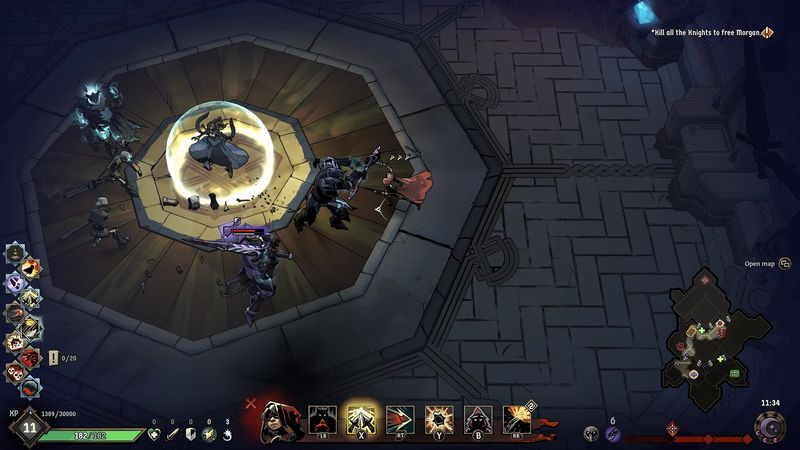
 Talking about integration, the visuals and graphics truly complement the story and gameplay. The artistic direction is clearly inspired by comic books. Bold color palettes and sharp animations emphasize both grandeur and gloom. The environments are not just backdrops but active participants. Details like flickering firelight on enemy silhouettes and seasonal weather effects make each battle vivid.
Talking about integration, the visuals and graphics truly complement the story and gameplay. The artistic direction is clearly inspired by comic books. Bold color palettes and sharp animations emphasize both grandeur and gloom. The environments are not just backdrops but active participants. Details like flickering firelight on enemy silhouettes and seasonal weather effects make each battle vivid.
 And don’t forget the audio and sound design! The soundtrack is fantastic—each track ramps up tension perfectly during boss battles or while sneaking through shadowy corridors. Crisp sound effects, from clashing weapons to eerie ambient noises, create an immersive audioscape that boosts adrenaline. Even though the voice acting sometimes feels on-the-nose, it adds character and helps define the heroes.
And don’t forget the audio and sound design! The soundtrack is fantastic—each track ramps up tension perfectly during boss battles or while sneaking through shadowy corridors. Crisp sound effects, from clashing weapons to eerie ambient noises, create an immersive audioscape that boosts adrenaline. Even though the voice acting sometimes feels on-the-nose, it adds character and helps define the heroes.
 With such an engaging roster, it’s hard not to appreciate the diversity in Ravenswatch. Each hero comes with unique traits—think of the lycanthropic dilemma of Little Red Riding Hood or the rebellious nature of the fallen Sun Wukong. Their backstories add layers to both the narrative and gameplay. The interplay between their moral complexities and the overall theme of corruption highlights the creative risks taken by Passtech Games.
With such an engaging roster, it’s hard not to appreciate the diversity in Ravenswatch. Each hero comes with unique traits—think of the lycanthropic dilemma of Little Red Riding Hood or the rebellious nature of the fallen Sun Wukong. Their backstories add layers to both the narrative and gameplay. The interplay between their moral complexities and the overall theme of corruption highlights the creative risks taken by Passtech Games.
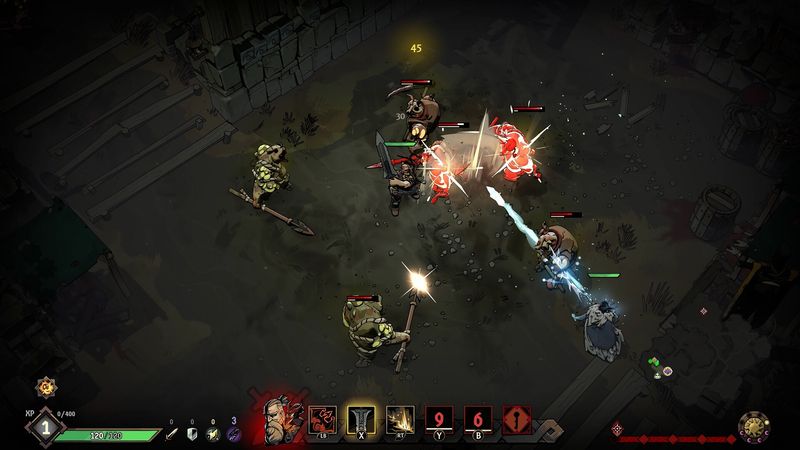
 Right, and from a completionist standpoint, the ongoing character development keeps me coming back. Unlockable skills, hidden backstories, and evolving hero narratives offer continuous goals. It’s satisfying when the game rewards you with nuanced build options and secret achievements after each run, making every playthrough a chance to see the heroes evolve.
Right, and from a completionist standpoint, the ongoing character development keeps me coming back. Unlockable skills, hidden backstories, and evolving hero narratives offer continuous goals. It’s satisfying when the game rewards you with nuanced build options and secret achievements after each run, making every playthrough a chance to see the heroes evolve.
 On the challenge level, Ravenswatch balances combat, exploration, and puzzle-solving for both hardcore and casual gamers. The combat is relentless but structured so you can learn enemy patterns and optimize your loadouts. Multiple difficulty levels also make it accessible, whether you’re a strategist like me or just in it for an adrenaline rush.
On the challenge level, Ravenswatch balances combat, exploration, and puzzle-solving for both hardcore and casual gamers. The combat is relentless but structured so you can learn enemy patterns and optimize your loadouts. Multiple difficulty levels also make it accessible, whether you’re a strategist like me or just in it for an adrenaline rush.
 Exactly, and replay value is huge here. With randomly generated maps, a plethora of upgrade isn’t just for show; it genuinely creates an environment that encourages multiple playthroughs. Every run can introduce a fresh set of talents or unexpected obstacles, which, even if sometimes a bit predictable, still keeps you on your toes when you’re chasing that perfect speedrun.
Exactly, and replay value is huge here. With randomly generated maps, a plethora of upgrade isn’t just for show; it genuinely creates an environment that encourages multiple playthroughs. Every run can introduce a fresh set of talents or unexpected obstacles, which, even if sometimes a bit predictable, still keeps you on your toes when you’re chasing that perfect speedrun.
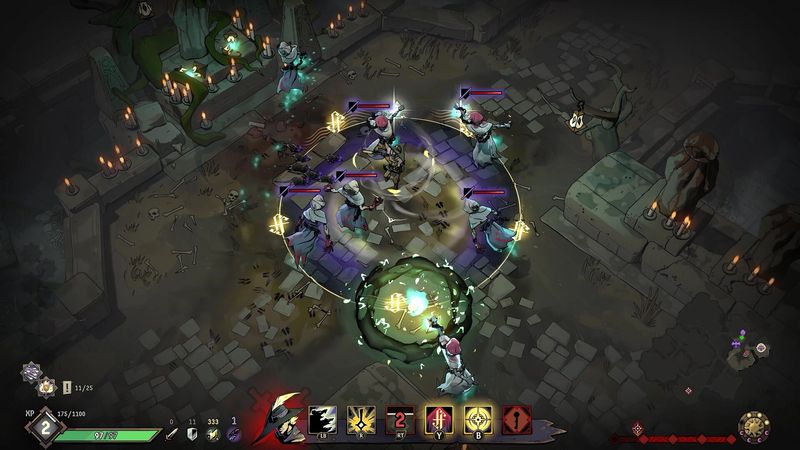
 So, if we were to wrap up our thoughts on Ravenswatch, I’d say the game is an exciting blend of narrative depth, strategic gameplay, and artistic expression. While there are areas for improvement—especially the variability in map design and minor technical hiccups—the collaborative spirit and continued updates suggest a bright future ahead for this title.
So, if we were to wrap up our thoughts on Ravenswatch, I’d say the game is an exciting blend of narrative depth, strategic gameplay, and artistic expression. While there are areas for improvement—especially the variability in map design and minor technical hiccups—the collaborative spirit and continued updates suggest a bright future ahead for this title.
 I’d agree. Ravenswatch stands out with its attention to detail and layered approach to both characters and gameplay mechanics. For players who love diving deep into every collectible and secret, it offers a robust experience despite its minor limitations.
I’d agree. Ravenswatch stands out with its attention to detail and layered approach to both characters and gameplay mechanics. For players who love diving deep into every collectible and secret, it offers a robust experience despite its minor limitations.
 And for those who thrive on mastering intricate mechanics and battling through hardcore challenges, this game is a treat, particularly given the skill-based gameplay and thoughtful balance adjustments driven by community feedback.
And for those who thrive on mastering intricate mechanics and battling through hardcore challenges, this game is a treat, particularly given the skill-based gameplay and thoughtful balance adjustments driven by community feedback.
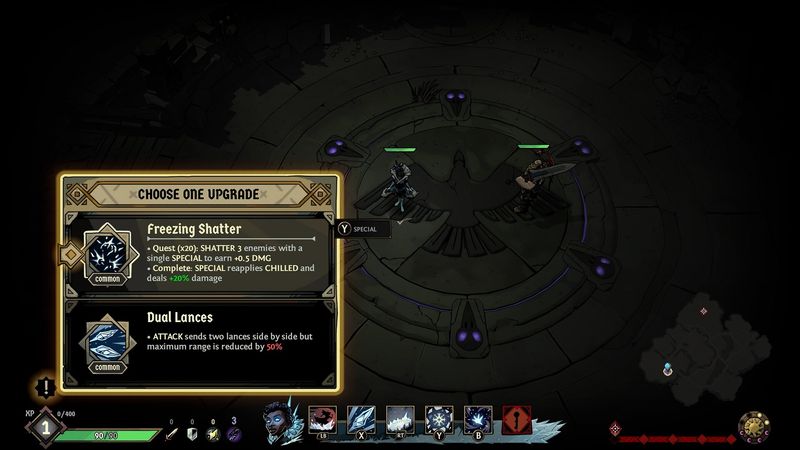
 Plus, if you love the thrill of optimizing every run and experimenting with speed tactics, Ravenswatch provides an engaging arena that’s only going to get better with time. The promise of regular free updates keeps the replayability fresh.
Plus, if you love the thrill of optimizing every run and experimenting with speed tactics, Ravenswatch provides an engaging arena that’s only going to get better with time. The promise of regular free updates keeps the replayability fresh.
 For anyone who enjoyed Ravenswatch, you might also like a few similar games. Consider Curse of the Dead Gods for more challenging rogue-like combat, Hades for its fast-paced action and evolving story, Dead Cells if you’re into fluid, responsive combat in procedurally generated levels, Risk of Rain 2 for its standout co-op experience and randomized gameplay, and finally Binding of Isaac for its unpredictable dungeon crawls with a dark, quirky twist. Each of these titles brings something unique to the table while complementing the spirit of adventure and challenge we found in Ravenswatch. What do you all think?
For anyone who enjoyed Ravenswatch, you might also like a few similar games. Consider Curse of the Dead Gods for more challenging rogue-like combat, Hades for its fast-paced action and evolving story, Dead Cells if you’re into fluid, responsive combat in procedurally generated levels, Risk of Rain 2 for its standout co-op experience and randomized gameplay, and finally Binding of Isaac for its unpredictable dungeon crawls with a dark, quirky twist. Each of these titles brings something unique to the table while complementing the spirit of adventure and challenge we found in Ravenswatch. What do you all think?
 Sounds like a great list—each offering a chance to dive deeper into the roguelike genre.
Sounds like a great list—each offering a chance to dive deeper into the roguelike genre.
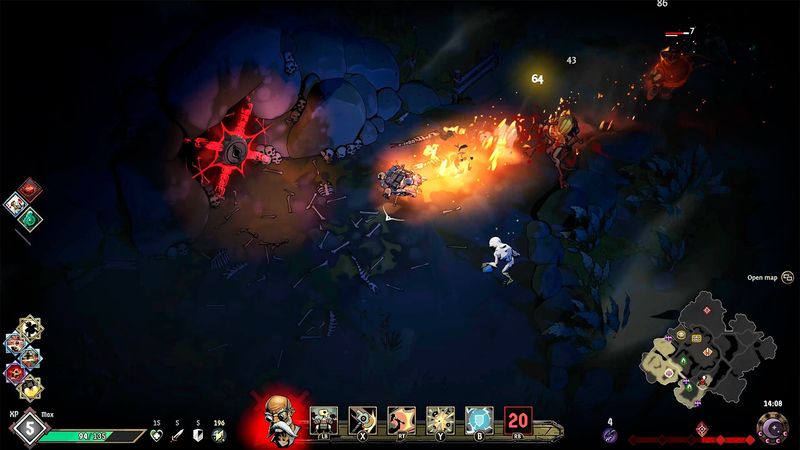
 Absolutely. It’s amazing to see how each game refines similar mechanics in its own way.
Absolutely. It’s amazing to see how each game refines similar mechanics in its own way.
 Can’t wait to clock some of those runs myself!
Can’t wait to clock some of those runs myself!
 This has been a fantastic discussion, team. Here’s to more epic adventures and a future filled with gaming stories that keep evolving just like our favorite titles!
This has been a fantastic discussion, team. Here’s to more epic adventures and a future filled with gaming stories that keep evolving just like our favorite titles!
